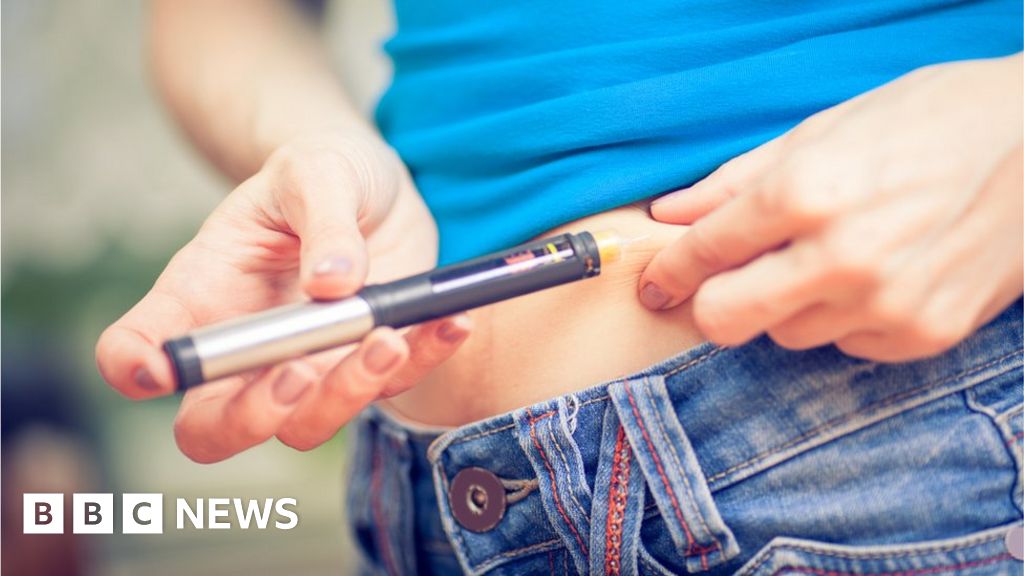- By Michelle Roberts
- Digital health editor
image source, Getty’s image
There has been an unusual increase in the number of children and adolescents worldwide being diagnosed with type 1 diabetes since Covid, researchers say.
A new study in the journal JAMA Network Open has pooled available data from various countries, including the UK, on more than 38,000 young people diagnosed during the pandemic.
The authors describe the increase in diabetes cases as “substantial”.
More work is needed to understand why the increases have occurred, they said.
Some of the increase can be attributed to catch-up – from backlogs and delays when health services are closed – but doesn’t explain all newly diagnosed cases, scientists said.
Before the pandemic, the incidence of type 1 diabetes in children was already increasing – around 3% per year.
- there was a 14% increase in numbers during the first year of the pandemic, compared to pre-Covid
- in the second year of Covid, it was up about 27% from pre-pandemic levels
Researchers from the University of Toronto said that, regardless of the cause, more resources and support may be needed for the increasing number of children and adolescents affected by type 1 diabetes.
What is type 1 diabetes?
- People with the condition must monitor their blood sugar levels closely and take insulin to control them because their bodies cannot do this automatically
- That’s because the insulin-producing cells in the pancreas are mistakenly destroyed by the immune system
- It occurs in both children and adults, but the cause is not fully understood and there is currently no cure
What’s behind the increase?
Experts say it’s unclear what sparked the spike in cases, but there are several theories.
One theory is that Covid could trigger a reaction in some children that increases the risk of diabetes. But among studies looking into this type of autoimmune reaction — in which the body starts attacking some of its own healthy cells — not all have found evidence to support this theory.
Another hypothesis is that exposure to some germs in childhood may help protect against a number of conditions, including diabetes. Some scientists believe it is possible that lockdowns and physical distancing during Covid mean many children are not getting sufficient exposure to germs and are missing out on this added protection.
Hilary Nathan, Director of Policy at the type 1 diabetes charity JDRFUK, said: “This research reflects the life-changing reality of so many families in the UK.”
She urges people to pay attention to the symptoms of type 1 diabetes: fatigue, thirst, needing to go to the toilet to urinate more often, and weight loss or increased thinness — collectively known as the four T’s.
“Knowing these signs and getting an early diagnosis and prompt treatment can save lives,” he said.
Theo, pictured with his mother Jo, controls his diabetes using an insulin pump
Theo, now 9 years old, was diagnosed with type 1 diabetes a year ago. It came just months after he contracted Covid. Her mother, Jo, said it came as a shock: “I didn’t know anything about diabetes.
“I think it was a misdiagnosis because he’s not bad with it. We were very lucky that we caught it early.
“You try to process that your child has this. You are taught all the scientific facts about this condition… to keep them alive. If you don’t do that, you know, there are dire consequences.”
Theo, who lives in Sheffield, now has an insulin pump and is managing his diabetes well.
Dr Faye Riley, from Diabetes UK, said: “Research around the world has identified a higher-than-expected number of diabetes diagnoses following the Covid-19 pandemic. This study adds to the evidence.
“Future studies examining long-term trends will be important for deciphering the impact of the pandemic from natural fluctuations in type 1 incidence over time, as well as establishing the various factors that may be behind the increase seen.”
#Unusual #rise #childhood #type #diabetes #Covid #BBC #News
